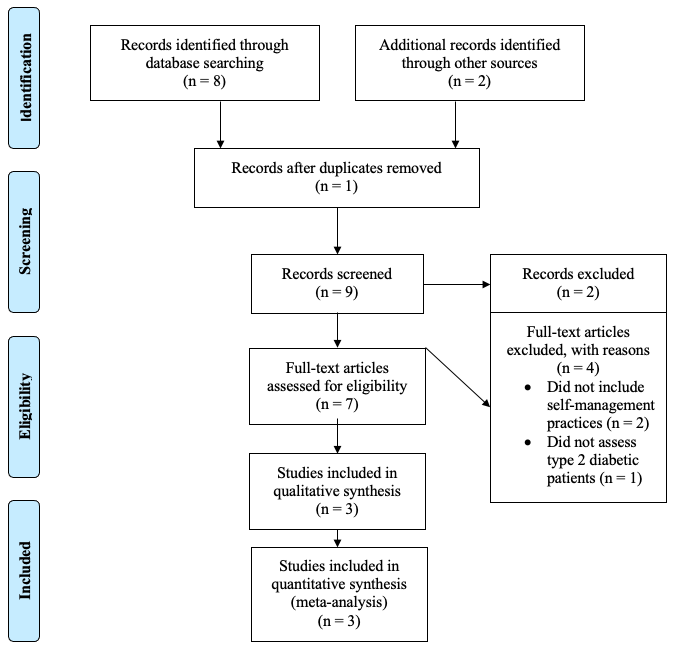Self-Management Education in Type 2 Diabetes Patients
Introduction
Type 2 diabetes is an illness characterized by elevated glucose levels caused by a metabolic disorder that leads to a decline in insulin production. According to Saltiel (2001), diabetes is a condition in which abnormalities in lipid and carbohydrate metabolism result in elevations in serum glucose. Engagement in certain behaviors can result in effective control. These include exercise, smoking cessation, and healthy eating habits. It is important to apply the aforementioned strategies to limit the incidence of complications. The prevalence of unhealthy behavior has facilitated the increase in the prevalence of individuals suffering from type 2 diabetes.
Research Question
Is self-management education beneficial in the management of type 2 diabetes?
Objective Method
This systematic review is intended to assess the effectiveness of self-management education in type 2 diabetes patients, as shown in Table 1.
Search Strategies
The collection and assessment of articles were conducted by analyzing published articles from a variety of electronic databases. The reviewed sources included ProQuest, PubMed, and ScienceDirect, using keywords such as self-care, diabetes mellitus, self-management, and education. The inclusion criteria were research associated with diabetes self-management, the effects of diabetes education, and the use of the English language. The articles that were excluded included publications from news outlets, non-academic websites, and those that used languages other than English.
Method of Review
It is also worth noting that randomized control trials, cross-sectional studies, and quasi-experimental studies were prioritized during the search. The identified data was collected, grouped, and analyzed for relationships with the subject matter. A total of eight articles were identified through the selection process. Upon further examination 3 met the aforementioned inclusion criteria and were used in the review process, as shown in Figure 1.

Figure 1: Data Synthesis: PRISMA Flow Diagram
Description and Characteristics of Selected Studies
The first study, which was conducted by Rusdiana et al. (2018), is a quasi-experiment focused on type 2 Diabetic Patients. The patients were exposed to a three-month intervention that included eight weeks of education on self-management of diabetes and four weeks of practice on the lessons taught (Rusdiana et al., 2018). The advice provided on diet management was based on information from international diabetes management organizations. It applied a systematic sampling technique. Participants attended a DSME program on self-management guidelines. The effect was assessed by measuring FBS, Hba1c, and BMI, and a T-test statistical analysis was conducted to evaluate the data. There was a significant difference in Hba1c values between pre and post-education in type 2 diabetics (P <0.005) (Rusdiana et al., 2018). The researchers concluded that diabetes self-management effectively reduces Hba1c levels in type2 diabetics. The study limitations include a short interval between pre and post-test and bias in the end-line survey.
The second study conducted by Rasoul et al. (2019) applied a quasi-experimental design focused on diabetic patients. The researchers estimated that 60 sessions were sufficient to educate the target population (Rasoul et al., 2019). Twenty lessons that highlighted vital aspects of diet were posted on the weblog, after which twenty regarding exercise, ten on medication, five for glucose measurement, and five for adhering to physician advice were added (Rasoul et al., 2019). The effects were assessed through the administration of a diabetes quality of life questionnaire. The data was analyzed using the Mann-Whitney technique, T-test, and Paired T-test. After the intervention, the test and control groups differed in terms of waist circumference, FBS, and BMI. There is a positive effect of weblog-based self-management on the quality of life of diabetic patients. The study limitation was that only patients that had the ability to use the internet were included in the study.
The final study was carried out by Bjonstad et al. (2021) who carried out a multicenter clinical trial among type 2 diabetes youth. The effects of the intervention were assessed through the evaluation of BMI, Hba1c levels, and the incidence of complications. Kaplan-Meier estimates, Cox proportional hazards regression models, and SAS software were used in statistical analysis. The researchers noted that the median glycated hemoglobin level rose over time, and the percentage of participants with non-diabetes levels decreased fr
Our Advantages
Quality Work
Unlimited Revisions
Affordable Pricing
24/7 Support
Fast Delivery